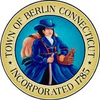Berlin, Connecticut
| Berlin, Connecticut | ||
|---|---|---|
| Town | ||

Rural Berlin from Short Mountain
|
||
|
||
 Location within Hartford County, Connecticut |
||
| Coordinates: 41°36′50″N 72°46′21″W / 41.61389°N 72.77250°WCoordinates: 41°36′50″N 72°46′21″W / 41.61389°N 72.77250°W | ||
| Country | United States | |
| State | Connecticut | |
| NECTA | Hartford | |
| Region | Central Connecticut | |
| Incorporated | 1785 | |
| Government | ||
| • Type | Council-manager | |
| • Town Manager | Denise McNair | |
| • Mayor | Mark Kaczynski (R) | |
| • Deputy Mayor | Brenden T. Luddy (R) | |
| • Town Council | Mark Kaczynski (R), Mayor Brenden T. Luddy (R), Dep Mayor David K. Evans (R) Charles R. Paonessa (R) Rachel J. Rochette (D) Peter A. Rosso (D) Kristin Campanelli (D) |
|
| Area | ||
| • Total | 27.0 sq mi (69.9 km2) | |
| • Land | 26.3 sq mi (68.2 km2) | |
| • Water | 0.7 sq mi (1.7 km2) | |
| Elevation | 105 ft (32 m) | |
| Population (2010) | ||
| • Total | 19,866 | |
| • Density | 740/sq mi (280/km2) | |
| Time zone | Eastern (UTC-5) | |
| • Summer (DST) | Eastern (UTC-4) | |
| ZIP code | 06023, 06037 | |
| Area code(s) | 860 | |
| FIPS code | 09-04300 | |
| GNIS feature ID | 0213388 | |
| Website | www |
|
Berlin (/ˈbɜːrlɪn/ BUR-lin) is a town in Hartford County, Connecticut, United States. The population was 19,866 at the 2010 census. It was incorporated in 1785. The geographic center of Connecticut is located in the town. Berlin is residential and industrial, and is served by the Amtrak station of the same name. Berlin also has two hamlets: Kensington and East Berlin.
The greatest boom to Berlin industry resulted from the decision of the Patterson brothers to start their business on West Street (now called Lower Lane). For twenty years until 1760, they kept their work in the family selling their wares from a basket. When demand increased they took apprentices into the shop and engaged peddlers to travel throughout the colonies selling the shiny, useful articles (the seal of the Town of Berlin shows such a "Yankee peddler" in eighteenth-century dress with a basket under his arm, a pack on his back full of tinware). As others learned the trade, they soon set up shop and hired apprentices. There were so many that the noise of the whitesmiths and their hammering could be heard in every part of town.
The town took parts away from Wethersfield (Now Rocky Hill and Newington), Middletown (Now Cromwell), Wallingford (Now Meriden) and Farmington (Now Southington and New Britain). Berlin was one of the birthplaces of interchangeable parts manufacturing and of the industrial revolution in the United States, in the workshop of Simeon North. The town was formerly known as Kensington.
...
Wikipedia

